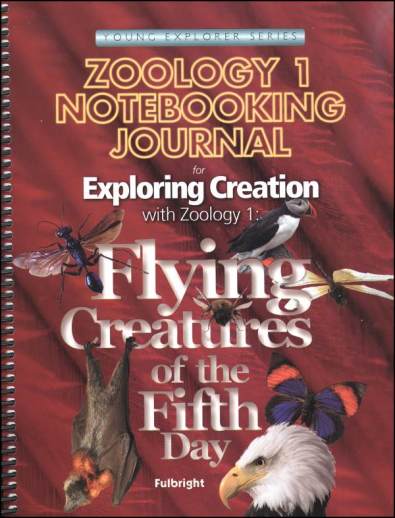We use cookies to make your experience better. To comply with the new e-Privacy directive, we need to ask for your consent to set the cookies. Learn more.
Zoology 1 Notebooking Journal
For a detailed comparison between several lapbook products designed for Apologia Science courses, check out our Lapbook Comparison Sheet
Complimenting Exploring Creation with Zoology 1, the Zoology 1 Notebooking Journal will provide everything your students need to complete their studies of insects, pterosaurs, bats and birds using Exploring Creation with Zoology 1. The Notebooking Journal serves as your child's individual notebook, providing a place for them to complete every assignment in the book. It includes a weekly schedule, templates for the notebook activities, nature hunts and record keeping, projects, experiments and much, much more.
Included in the Zoology 1 Notebooking Journal is:
- A daily Schedule for completing the readings, notebook assignments, activities and experiments utilizing a two-day per week plan. Included also is an alternative schedule for cold climates.
- Fascinating Facts Templates for your student to record what they learned with both words and illustrations for each lesson.
- Templates for completing the Notebooking Activities.
- Review Questions for each lesson, which can be answered orally or in writing as a written narration.
- Scripture Copywork, with both print and cursive practice - which is a valuable method for memorizing Scripture, teaching spelling, grammar and writing, as well as handwriting practice.
- Project Pages and Scientific Speculation Sheets for the student to keep a record of and log experiments or projects completed throughout the course.
- Fly Higher ideas for each lesson which compiles additional activities, projects, experiments, books or videos that correlate with the lesson.
- Beautiful, full-color, lapbook-style Miniature Books, which the students may wish to create, encouraging them to record facts and information they learned in each lesson. These are then placed on the Miniature Book Paste Page, to display in their notebook.
- Field Trip Sheets to keep a record field trips they enjoyed during their studies.
- A Final Review with fifty questions the students can answer either orally or in writing to show off all they remember and know about insects, bats, pterosaurs and birds at the end of the course.
These Notebooking Journals are a perfect compliment to the Exploring Creation series. Each student will cherish their individual notebook as they make it their very own with words and illustrations reflecting all they have learned in their pursuit of science. Additionally, it serves as your record of your student's scientific endeavors throughout the year. When your child flips through their notebook, they will be reminded of the knowledge they have attained, reviewing the material as they peruse the pages they have created.
A variety of activities include full-color mini-books, additional fun experiments, crosswords, and supplementary materials. Recommended for use with students who have mastered handwriting, can take notes, and enjoy upper elementary level activities.
Apologia Science courses are written from a Biblical worldview with the homeschool in mind. At the elementary level, courses follow a Charlotte Mason-inspired methodology, with lessons organized around narration, notebooking exercises and hands-on activities or projects. Children at different ages can use these together, learning at their own level. Each course is designed to be teacher-student interactive, so teacher involvement is fairly high at this level. At the junior high and high school levels, science courses are more traditional in nature, with the textbook written to the student. Teacher involvement time at this level is much less than at the elementary level. Textbooks contain student reading, lab instructions, "On Your Own" questions and Study Guide questions. A Solutions Manual provides the answers to these and the test questions. Lab kits are available separately for both the elementary and upper-level science courses which include most of the harder to find items you will need.
Birds, bugs, and bats if it flies, it's explored in this fascinating introduction to zoology! The first portion of the book focuses on birds and their unique characteristics. Kids will learn bird anatomy, how they are able to fly, why they build nests, how they raise their young, and more. They'll also learn to identify the birds they see every day and do activities that explore the habits and preferences of different species of birds. Students will learn about bats, some of the most useful and wonderful flying creatures in the world. As they study the physical characteristics and lifestyle of the bat, they'll gain a new appreciation for these creatures. Finally, kids will get up close and personal to the insect world. They'll learn how to identify and classify the many different types of bugs they see, and they'll even get to design their own experiments with different insect species. Kids will get the opportunity to keep their own field journals as they are encouraged to be their own scientist as they observe and understand the world around them.
| Product Format: | Softcover Book |
|---|---|
| Brand: | Apologia |
| Author: | Jeannie Fulbright |
| Grades: | K-6 |
| ISBN: | 9781935495116 |
| Length in Inches: | 11 |
| Width in Inches: | 9.375 |
| Height in Inches: | 0.8125 |
| Weight in Pounds: | 1.75 |

